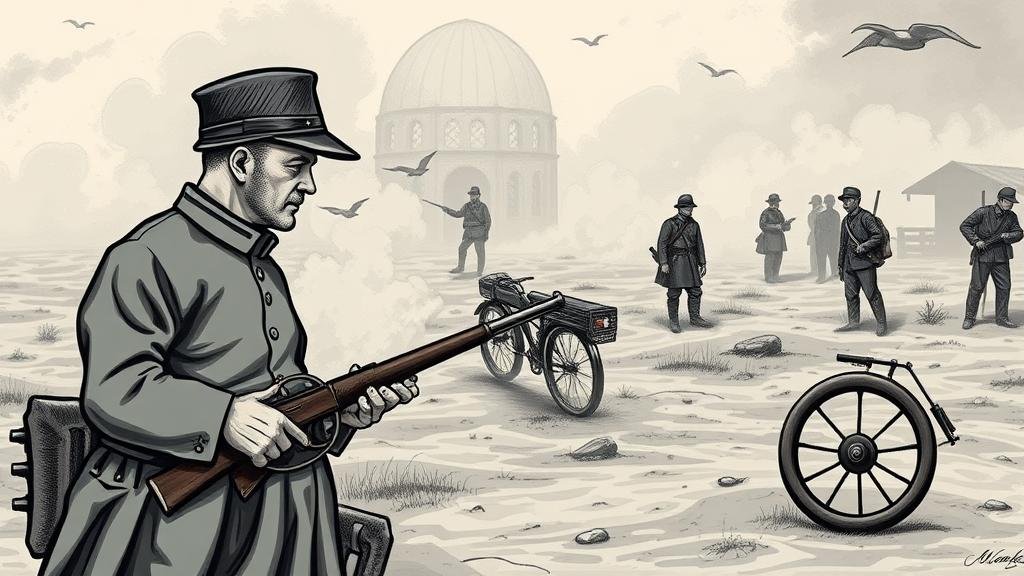First-Person Accounts of Battlefields: Tracking Artifacts from Soldiers’ Writings
First-Person Accounts of Battlefields: Tracking Artifacts from Soldiers’ Writings
First-person accounts of battlefields provide invaluable insights into the human experience of warfare. These writings, often categorized as letters, diaries, and memoirs, serve as essential artifacts for historians, offering personal perspectives that complement traditional historical narratives. This article explores various dimensions of these first-person accounts, emphasizing their significance, challenges in analysis, and the artifacts they produce that enhance our understanding of military history.
The Historical Context of First-Person Accounts
The emergence of first-person accounts of battlefields can be traced back to significant conflicts, notably the American Civil War (1861-1865). It is estimated that between 1861 and 1865, approximately 2.1 million men served in the Union and Confederate armies, many of whom documented their experiences. For example, the letters of soldiers like Sullivan Ballou, a Union officer who fell in the First Battle of Bull Run, provide intimate narratives that highlight the emotional impact of warfare (C-SPAN, 2001).
Analyzing the Nature of Artifacts
The artifacts of soldiers writings are multifaceted. They can include:
- Letters written to family or friends, revealing personal emotions and thoughts.
- Diaries kept during campaigns, chronicling daily events and personal reflections.
- Memos and reports that provide insight into tactical considerations.
These writings not only document military events but also illuminate the societal attitudes of the time, revealing how soldiers viewed issues like honor, patriotism, and the psychological toll of combat.
While first-person accounts are invaluable, they pose significant challenges in interpretation:
- Subjectivity: Personal biases and emotions can color narratives, making it essential for historians to cross-reference with other historical data.
- Contextual Understanding: The social and political climates in which these accounts were written must be understood to draw accurate conclusions.
- Preservation Issues: Many original documents have degraded over time or been lost, limiting the available evidence.
For example, the diary of a Confederate soldier during the Battle of Gettysburg may highlight valor in battle but downplay the fear and uncertainty experienced in the lead-up to conflict. Hence, historians must approach these accounts critically.
Case Studies: Notable Examples
Several notable case studies further demonstrate the significance of first-person battlefield accounts:
- The Diary of a Union Soldier: The diary of 20-year-old Pvt. Joseph W. McCauley, who served in the 141st Pennsylvania Volunteer Infantry, offers profound insights into the daily life and hardships faced by soldiers during the Siege of Petersburg.
- Letters from the Front: The correspondence of American soldier John D. Lee, who fought in both World Wars, details his experiences and evolving perspective on warfare over decades.
Each case reinforces the critical role of these artifacts in shaping a nuanced understanding of warfare.
Real-World Applications
First-person accounts have real-world applications in various fields:
- Historical Research: Scholars use these narratives to build comprehensive histories of specific conflicts, enriching academic discourse.
- Education: Educators employ primary sources in classrooms to engage students and foster critical thinking about history.
- Psychological Analysis: Mental health professionals study these accounts to understand the psychological effects of combat on soldiers, informing treatment approaches for veterans.
Conclusion
First-person accounts of battlefields are essential artifacts in understanding the complex nature of war. They provide unique insights into the thoughts, feelings, and realities faced by soldiers, complementing traditional historical narratives. To fully appreciate their value, it is crucial to navigate the challenges of interpretation and appreciate the context in which these accounts were created. As society continues to grapple with the realities of warfare, preserving and analyzing these writings will remain vital to understanding the human experience in conflict.
In summary, engaging with first-person accounts not only enhances historical scholarship but also actively contributes to collective memory and the ongoing discourse surrounding war.



